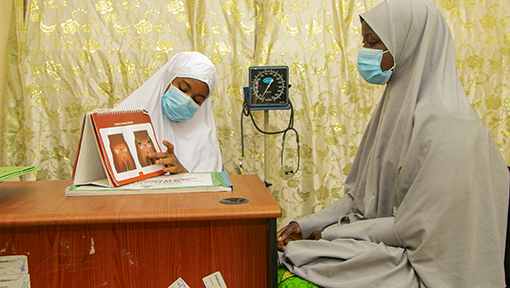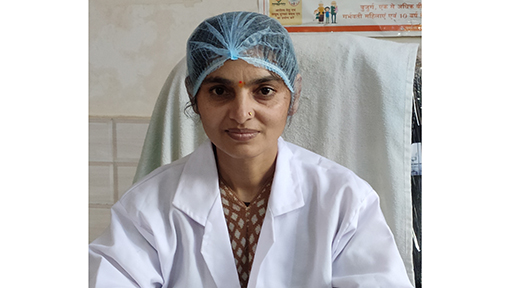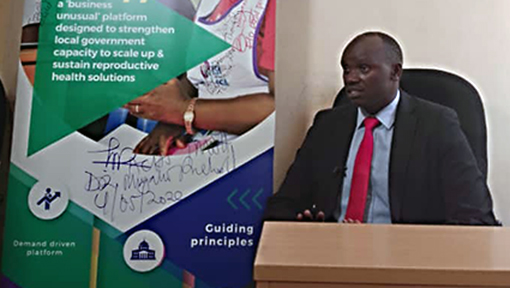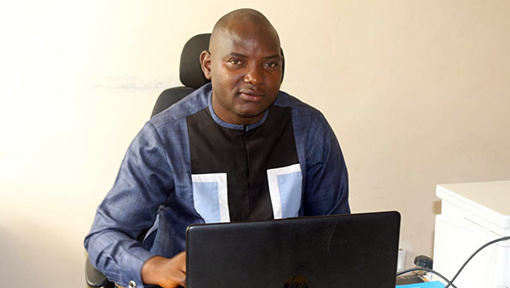2BY2 Tool in Uttar Pradesh Helps ASHAs Appreciate the Value of Using Data for Decision-making
Contributors: Mohammed Rizwan, Anupam Anand, Dr. Asha Gupta and Deepti Mathur

Anita is an ASHA who has recognizes the value of data for decision-making after receiving coaching from TCI.
The Challenge Initiative (TCI) seeks to strengthen the capacity of local governments to better serve the health needs – specifically the family planning needs – of the urban poor. The urban landscape is a complex and challenging environment that requires adaptive approaches and continuous learning. However, self-motivation and ownership by health system change agents are required so that others within the health system, civil service and community are inspired.
Community health workers collect many important data points in various registers, but because the data isn’t used by them, the importance of collecting it is often undervalued. In the recent past, the Government of India (GoI) introduced the urban health index register (UHIR) as a data collection tool to consolidate the various registers. Yet, community health workers were overwhelmed by the complexity of the tool.
TCI then devised the 2BY2 prioritization tool to highlight the most valuable information of interest and use to community health workers from specific data collected in the UHIR. This visual tool is designed to instill in a last-mile health worker the behavior of using data for decision-making.
Anita, an urban accredited social health activist (ASHA), serves as a role model to other ASHAs in maintaining her UHIR and using TCI’s 2BY2 prioritization tool to better serve the households in her catchment area. Anita recently shared her experience using these tools with the Medical Officer in Charge of the Majholi urban primary health center (UPHC) in Moradabad and what it has meant for her personally and professionally:
As an urban ASHA, I am assigned to a population of 2,000 urban poor residents. I am expected to complete the details of population of that area in the UHIR or ASHA diary, as we call it locally in Uttar Pradesh. Before I received coaching from TCI, my register was never complete. I found it bulky and a laborious task to update it regularly. Moreover, I did not understand its various sections.
The TCI team explained its various sections, coached me on how to simplify this task and practically transfer the details from available sections to complete the remaining sections. They made me aware that by updating the register, I can extract information into a family planning due list. This activity is eligible for a certain portion of incentives announced by GoI. Also, other information from UHIR can be retrieved to claim incentives as per government schemes, like the ensuring spacing at birth (ESB) scheme.
Gradually, I learnt about the 2BY2 Prioritization Tool and I observed how this due list can be analyzed to identify non-users of modern methods. We could just use this number to plan our household visits. My supervisor also coached me on this prioritization tool and it became a regular feature of discussion and agenda during the monthly ASHA-ANM (auxiliary nurse midwives) meetings.
I was surprised to know that the magic wand – UHIR was in my hand, and I did not know how to utilize it. I felt motivated as this not only helped me do my work better but also helped me grow personally. I became aware of how to identify and connect interested family planning clients with services during Antral diwas (Fixed day static services) and Urban Health Nutrition Days (UHNDs).
It had started to come into practice, but COVID disrupted all identified and routine activities. I felt helpless. At that time, ANM didi with support from TCI coached me virtually on continuing the completion of UHIR and devising a due list. Therefore, at the time of COVID also, I could fill the 2BY2 matrix and serve the family planning needs of the people of my area. I also identified the need for short-acting methods and shared the demand with ANM didi.”
As a result of effectively using these data tools, Anita has continued to be able to claim Rs.300 for updating her UHIR in the time of COVID and meeting the family planning needs of clients in her area, earning her appreciation and recognition at the UPHC monthly meetings.






